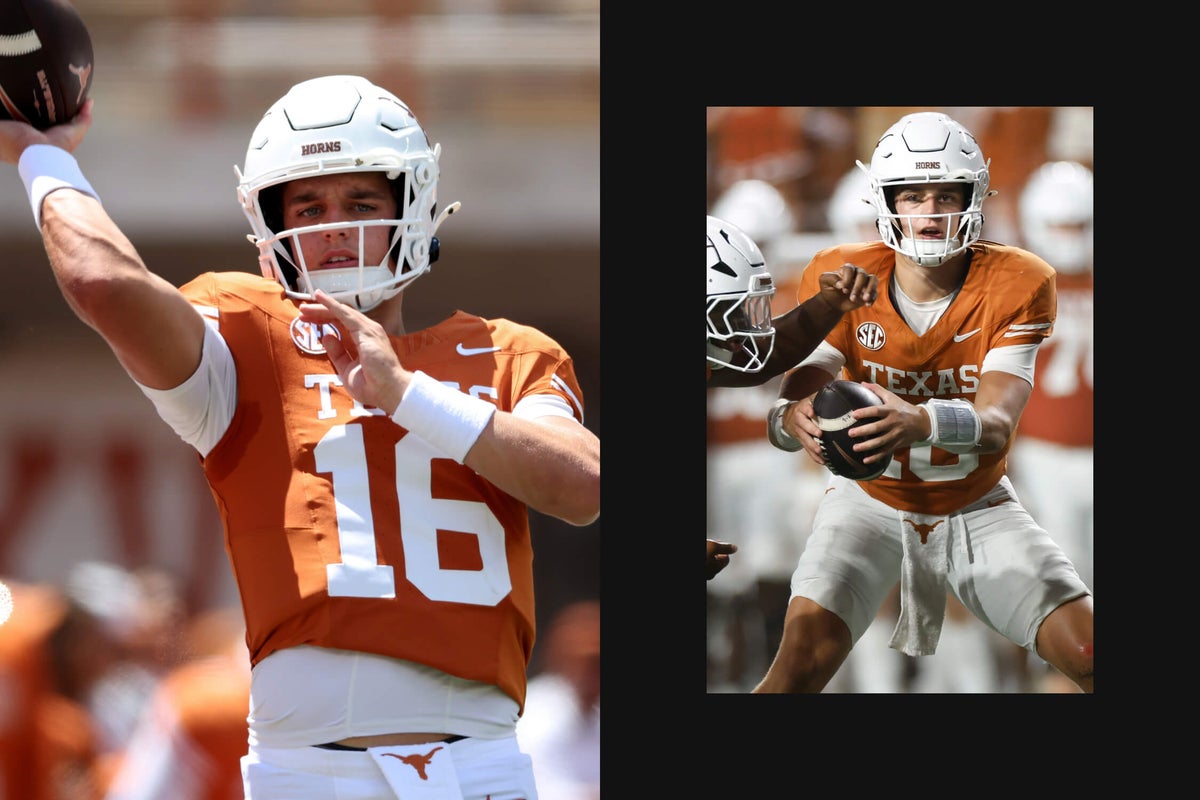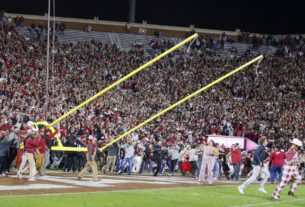Arch Manning has played in five college football games for the University of Texas, including one start and four appearances in which the game was well in hand by the time he took the field. For a quarterback who isn’t expected to be a full-time starter until 2025 and won’t be eligible for the NFL Draft until 2026, that’s not a lot of material to go off.
But for the nephew of Super Bowl-winning quarterbacks Peyton and Eli Manning and the grandson of a College Football Hall of Famer and SEC legend Archie Manning, that limited action has been more than enough to stoke excitement about what lies ahead for QB1-in-waiting for the nation’s No. 1 team.
In the wake of Manning’s first start, we spoke with three coaches and evaluators who have studied his early-season performance, turned to the tape to further unpack where he can still grow and compared the opening weeks of his college playing career to those of his famous relatives Archie, Peyton and Eli.
What coaches say
Granted anonymity to offer a candid evaluation of an opponent (or potential opponent as not all of these speakers have seen Manning live or will see him this season), the group describes a quarterback who oozes talent but still has plenty of room for growth.
“He’s just so big,” said an FBS head coach. “He’s fast. He’s got a strong arm. And he’s got the bloodline.”
“(He) throws a great deep ball,” said a Power 4 personnel director.

GO DEEPER
Arch Manning transferring from Texas never would have made sense
Manning has displayed that ability often in his short time in the lineup. Against Louisiana-Monroe, he had 10 pass attempts that traveled 20 or more yards in the air, according to TruMedia. He completed three of them. A fourth potential completion to a diving Silas Bolden was ruled incomplete on replay review.
By comparison, starting quarterback Quinn Ewers had only seven pass attempts of 20 or more air yards in his first two-plus games until suffering the oblique injury that opened the door for Manning’s first start. But Ewers also connected on three of them.
Manning’s 51.7 percent completion percentage against ULM was underwhelming, but Texas coach Steve Sarkisian said that was a byproduct of a game plan in which he and quarterback coach AJ Milwee installed a lot of deep passing plays to take advantage of Manning’s downfield prowess.
“Arch is a really good deep-ball thrower and gives guys chances to go make plays on those shots down the field,” Sarkisian said Monday. “But … I’m kind of kicking myself a little. I wish I had a few other freebie completions for him just so that there could have been a little bit more balance and getting that completion percentage up, being efficient and moving the chains.”

GO DEEPER
Watching Arch Manning: How the QB navigated his first start at Texas
Sarkisian didn’t scheme up a ton of easy, short completions for Manning, though he does want to see him be more willing to take checkdowns when downfield shots are unavailable.
“They asked him to go run the offense and do the things that they want to do from a (down and distance) standpoint, a situational standpoint,” Mississippi State coach Jeff Lebby said Wednesday ahead of the Bulldogs’ meeting with Texas in both teams’ SEC opener. “I didn’t think they tried to protect him in a bunch of different ways. They just let him go play ball.”
Which seems like a sound strategy. If you were creating a quarterback in a lab, it would probably come equipped with a lot of what Manning has.
“When he’s in a clean pocket and has time to throw, he can put the ball just about anywhere he wants,” an SEC scouting director said.
And then there’s his speed — the first thing two of the staffers mentioned and the trait that sparked several jokes after he burned UTSA’s defense on a 67-yard touchdown run in Week 3. The personnel director highlighted Manning’s athleticism, noting that some are quick to assume that he’s slow like his uncles.
“He’s faster than I realized,” the FBS head coach said.
CAN’T TOUCH HIM
@ArchManning pic.twitter.com/65nR57qIR5
— Texas Football (@TexasFootball) September 15, 2024
So what does Manning need to work on?
“You can see him lock onto guys at times,” the Power 4 personnel director said.
“A couple of times, he pulls the trigger late or not at all when he could have,” the SEC scouting director said.
Other growth areas such as working through his reads and progressions can be expected to come with more playing time and practice reps. Sarkisian said he liked Manning’s poise and composure, especially after throwing two first-half interceptions against ULM.
“I’ve just been impressed for a guy early on in his career, the way he rebounded,” he said. “I’ve seen a lot of young quarterbacks have a rough start and then that rough start turns into a rough game. And it was a little bit of a rough start for him, but I thought he rebounded and did some nice things for us at the right time.”
One thing everyone agreed on: Manning has a bright future, and the fact that he hasn’t been forced into a full-time starting role early in his career will help him.
“In the long run, it’ll be really good for him to sit for two years (behind) Ewers,” the Power 4 personnel director said. “He’ll be more ready to take over. I think sometimes we try to push these guys into starting roles, or they get greedy and feel like they have to play earlier. Him staying patient will pay off for both sides.”
“Time will tell, but I imagine he’s going to be a first-round pick and the No. 1 player picked, if I had to bet,” the FBS head coach said.

GO DEEPER
How Texas is achieving rare QB harmony with Arch Manning, Quinn Ewers
The family resemblance
All amateur Manning family historians know Cooper Manning was the original Chosen One of Archie Manning’s children. Peyton’s star receiver in high school, Cooper was forced to retire before his Ole Miss career began due to a spinal issue.
A powerful and explosive 6-foot-4 receiver, Cooper was the only one of Archie’s boys to move like him on a football field. Archie Manning was a legitimate dual-threat quarterback — both in college and the NFL. He finished his college career with 31 touchdown passes and 25 rushing touchdowns, including 14 as a junior in 1969. Cooper, of course, is Arch Manning’s father.
In this case: Like grandfather and father, like son. Like uncles? We’re going to find out.
Athletically, Arch Manning is the best of the bunch. At 6-foot-4, 225 pounds, Manning’s athletic burst and straight-line speed are good enough to be a weapon at Texas and at the next level. Not only can he be part of the run game, but Arch’s athleticism also allows him to escape the pocket and make throws on the run in ways neither Peyton nor Eli really ever could. In short: Arch’s margin for error is much wider than that of his uncles. Much more like Archie.
The stuff that separated Peyton and Eli (especially Peyton) from the pack, though, was almost exclusively between the ears. Every member of the Manning family has elite arm talent. Peyton and Eli’s competitive drive, attention to detail, mental toughness and consistency became their signature traits. Peyton Manning worked on his quarterback drops probably more than a golfer works on his swing. Eli became known as an unflappable player who never let the pressure of a moment impact his ability to think two steps ahead.
Frankly, we don’t have enough data yet on how Arch will compare to the rest of the quarterbacks in the family. However, the areas he needs the most growth in right now are the things that made his uncles Hall of Famers — which should be no surprise.
What the tape says
Arch Manning’s footwork is advanced well beyond his age. His processing and general pocket awareness, however, still need more work. To be fair, neither Peyton nor Eli were experts in these areas as first-time starters. No one really is.
There are times when Arch will stick onto his first read (especially if it’s a deep one) for too long, which either forces an errant throw elsewhere or results in him taking a hit. He hasn’t read every concept perfectly. He has thrown multiple balls into double coverage, and he paid for it with two interceptions against ULM. He’s also made some pretty great throws.
Manning’s next start will be the best opportunity to get an early picture of just who he is as a player. He’ll have gotten the first one out of the way, seen his mistakes and had a chance to learn from them.
He’s not there today. We’ll see if it ever happens. However, it’s hard not to see how Arch Manning has a little bit of something from every one of the elder men in his family. And if he can become the type of self-correcting, self-driven player his uncles were, then he’ll have a chance to be better than both of them. Grandpa, too.
How Arch’s debut compares with other Manning family first starts
Archie Manning was actually drafted by the Atlanta Braves before he got to Ole Miss (he would be drafted three more times by an MLB team) and became the program’s first sophomore starter in years.
He started the 1968 opener against Memphis State and finished 8 of 14 for 116 yards, three touchdowns (two pass, one rush) and an interception in a comeback victory. Two weeks later, he completed 11 of 26 passes for 129 yards and the game-winning touchdown pass in a 10-8 upset of Alabama, the program’s first win against the Crimson Tide in nearly 60 years. Though he finished his first year as a starter with a whopping 17 interceptions, Archie Manning would eventually change Ole Miss’ program (and college football) forever as one of the sport’s first nationally televised star quarterbacks. More than two decades later, Archie’s middle son entered college football. And that kid had everything.

GO DEEPER
Arch Manning won’t be only football royalty on field Saturday night. Meet General Booty!
The pre-signing day pressure on Louisiana-born Peyton Manning as the son of an Ole Miss icon was massive. The fact he was a top-15 player nationally (behind fellow Louisiana QB Josh Booty) only made it more intense. If Peyton dropped a bead of sweat, though, nobody saw it. One of his biggest concerns ahead of the 1994 signing day was deciding early. Not because he wanted to get it over with, but because he needed to call 50-odd head coaches and tell them to sign someone else. On the day he committed to Tennessee, Manning also apologized to the people of Mississippi.
His first appearance at Tennessee was actually in relief as a true freshman in 1994. Replacing an injured Todd Helton (yes, the baseball player), Manning went 14 of 23 for 256 yards, two touchdowns (including a 76-yarder) and a pick in a loss to Mississippi State. The following week, Manning slogged through a 7-of-14, 79-yard day in a 10-9 upset win over Washington State.
Though he was a more accomplished prep passer than his older brother, Eli Manning was not the prospect Peyton was ahead of signing day in 2000. Eli had offers and interest from most of the SEC, including Tennessee. But there’d be no Mississippi apology this time, as Archie’s youngest son picked the Rebels and Manning mentor David Cutcliffe. After sitting as a freshman, Manning began the 2001 season as Ole Miss’ starter and proceeded to break multiple records in his debut. Eli went 20 of 23 for 271 yards and a school-record five touchdowns. He also completed 18 straight passes, another record.
Arch Manning’s starting debut would likely finish somewhere between that of his grandfather and uncle Eli: 15 of 29, 258 yards, two touchdowns and two interceptions in a lopsided win over Louisiana-Monroe.
I win! https://t.co/eziyNxsQAR
— Eli Manning (@EliManning) September 23, 2024
(Illustration photos: Tim Warner / Getty Images)





